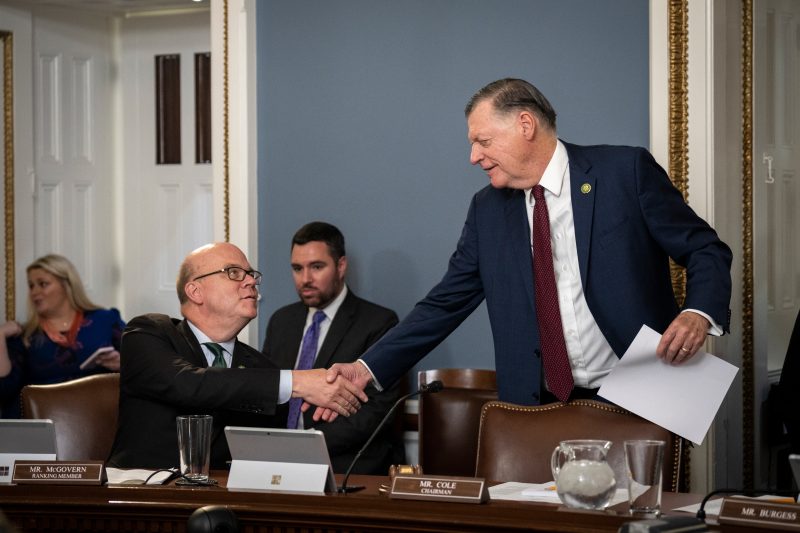After a series of failed votes in early January, Kevin McCarthy (R-Calif.) finally gave in and agreed to add some far-right lawmakers to the obscure but powerful Rules Committee — a demand from conservatives that helped him secure the votes to win the speaker’s gavel.
Now, having cut a debt-and-budget deal with President Biden, McCarthy will soon learn whether that concession to the far right was a bridge too far to pass compromise deals with Democrats.
Often called “the speaker’s committee,” the Rules panel is made up entirely of appointees from the House speaker and minority leader. It’s tilted in such an extreme way — nine members of the majority party, just four from the minority — that the speakers always get their way.
Most legislation that goes to the full House must first be considered by this committee, which determines the amendments, if any, that will be considered, how long debate will be and any other special considerations, before the legislation goes to the floor. Longtime lawmakers and aides were stunned by the concession, because it effectively took McCarthy’s overwhelming majority on the committee and made it beholden to the far right.
“It is the mechanism that the Speaker uses to maintain control of the House floor,” Rep. Thomas Massie (R-Ky.) wrote in his official bio, explaining his new assignment.
To fulfill his promise to give the hard right a voice on the panel, McCarthy appointed Massie and Reps. Ralph Norman (R-S.C.) and Chip Roy (R-Tex.). Norman and Roy are members of the far-right House Freedom Caucus, which has been highly critical of the Biden-McCarthy deal framework, while Massie is an eclectic libertarian who is socially and ideologically close to the Freedom Caucus.
By tradition, the minority party’s committee members never vote for a rule drafted by the majority, and if the three staunch conservatives do not approve of any McCarthy deal, they could sink the bill in the Rules Committee by teaming up with the four Democrats.
Roy and Norman are already opposed to the legislation.
“This is totally unacceptable, and it’s not what we agreed to,” Norman told The Washington Post on Friday, as the contours of the deal took shape.
After McCarthy briefed Republicans in a conference call late Saturday, Norman took to Twitter to denounce the deal as “insanity.” Roy on Sunday morning tweeted that the deal was a “turd-sandwich.”
1st – the leadership playbook is to line up cheerleading on phone calls to demonstrate “unity.” 2nd, not 95% – I know of more no’s than that already. 3rd – they haven’t been educated yet on what a turd-sandwich this “deal” is. They will be. https://t.co/gaJhMT6LM3
— Chip Roy (@chiproytx) May 28, 2023
That could leave Massie as the swing vote on the Rules Committee: Hypothetically, four Democrats plus Norman and Roy would vote no, with McCarthy’s six staunch allies voting yes.
Massie is officially undecided on the legislation.
“Need to see text,” Massie wrote via text message Sunday.
An engineer who created a technology company and obtained 29 patents, Massie has veered between being a major thorn in the side of GOP leaders and being an emerging ally. In January, Massie supported McCarthy for speaker from the outset and worked as an intermediary to the roughly 20 holdouts who drove a hard bargain before allowing McCarthy to win the gavel.
Massie then won the plum Rules Committee post and a spot on the Select Subcommittee on the Weaponization of the Federal Government.
On Sunday, McCarthy name-checked Massie for his work on a provision that got included in the deal with Biden, a procedural mechanism that requires Congress to approve all 12 of the appropriation bills that fund federal agencies.
The text of this proposal is not yet available, but it appears that if Congress does not finish its work on those bills, then the entire federal government would continue to function on the previous year’s allotment, minus a 1 percent cut.
“So it gives you the incentive, also, to do your job. This was as an idea that [was] brought forth by Thomas Massie, and I think it’s a very positive idea,” McCarthy told reporters.
To get his provision into law, Massie might have to be willing to cross his conservative friends and vote for the overall legislation, first in the Rules Committee and then on the House floor.
If Massie joins Roy and Norman in opposition, there’s no prohibition against Democrats on Rules voting for the bill to advance it to the floor — but it’s just something that no one can recall happening in the modern, politically polarized era of Congress.
Outside conservative activists have already begun to focus on the committee’s three most conservative members. Russ Vought, the former budget official from the Trump administration who runs a think tank that advises Freedom Caucus members on fiscal policy, spent Saturday night and Sunday morning railing against the Biden-McCarthy deal on Twitter.
“There are three conservatives on the all-important Rules Committee for a reason,” Vought wrote at 1:34 a.m. Sunday. “Good night.”








